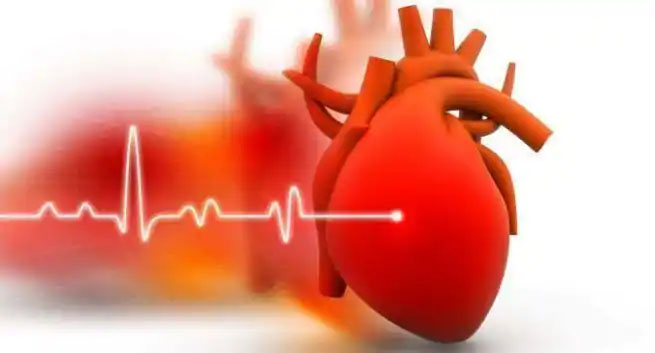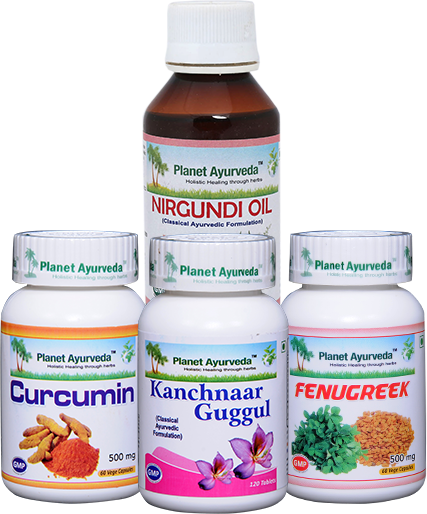How Can MVP With Atrial Fibrillation Be Treated With Ayurveda?
Introduction
Mitral Valve Prolapse (MVP) is a condition in which two flaps of mitral valve do not close smoothly or evenly, but instead there is bulge in left atrium. Mitral Valve Prolapse (MVP) is also known as click murmur syndrome, Barlow’s syndrome or floppy valve syndrome. The mitral valve is located between left atrium and left ventricle and is composed of two flaps. In normal condition these two flaps are held tightly closed during left ventricular contraction (systole) by chordae tendinaeae (small tendons called cords that connect flaps to the muscles of heart ).

In the mitral valve prolapse, the flaps enlarge and stretch inward towards the left atrium. Sometimes snapping during systole may allow some backflow of blood into left atrium. The stretching and enlargement of left atrium of heart can leads to atrial fibrillation. Atrial fibrillation is an irregular and often rapid heartbeat that can increase your risk of heart strokes, heart failure and other heart related complications.
Causes and Symptoms
CAUSES
The exact cause of MVP is not known but heredity plays an important role. Primary and secondary mitral valve prolapsed are described below
- Primary Mitral Valve Prolapse (MVP) It is characterized by thickening of one or both valve flaps. There is scarring of flap surface, thinning and lengthening of chordae tendinaeae, and fibrin deposits on flaps. The primary form of mitral valve prolapsed is seen in people with Marfan’s syndrome or other connective tissue disorders, but is most common in people with no heart disease.
- Secondary Valve Prolapse This is not due to thickening of valve instead of that there are ischemic changes. In this prolapse there is ischemic damage ( caused by decreased blood flow due to coronary artery disease ) to the papillary muscles attached to the chordae tendinaeae or to the functional changes in the myocardium. It may results from damage of valvular structures during acute myocardial infarction, rheumatic heart disease or hypertrophic cardiomyopathy.
Atrial fibrillation is mainly caused by MVP. There are other causes too which can cause Atrial Fibrillation
- High Blood Pressure
- Heart Attack
- Coronary Heart Disease
- Viral Infections
- Previous Heart Surgery
- Excessive Intake of Stimulants Such As Alcohol, Caffeine
- Sleep Apnea
Causes According To Ayurveda
- Physical Exertion
- Drastic And Excessive Purgation
- Anxiety
- Fear
- Terror
Faulty Management Of Disorder
- Suppression of Ama and Vomiting
- Injury
Symptoms
MVP may remain asymptomatic in few people. Each individual may experience symptoms differently. Here are most common symptoms
1. Palpitations This is most common complaint among people with MVP (Mitral Valve Proplapse). These palpitations are usually associated with premature ventricular contractions (the ventricle beats faster than it should). Some patients may experience palpitations without dysrhythmias.
2. Chest Pain This associated with MVP is different from chest pain associated with coronary artery disease and is a frequent complaint. Chest pain is not like angina pain but can be recurrent.
Other Symptoms
- Shortness of Breath
- Reduce Ability To Exercise
- Weakness
- Dizziness
- Fatigue
Sypmtoms According To Ayurveda Abnormal Complexion

- Fever Due To Inflammatory Heart Disease
- Fainting
- Breathlessness
- Anorexia
- Thirst
- Chest Pain
- Giddiness
Complications
Following Complications May Occur In People
- Heart Strokes
- Heart Failure
- Heart Arrhythmias
- Hypertension
Diagnosis
People with Mitral Valve Prolapse (MVP) have no symptoms. Detection of click or murmur may be diagnosed during routine checkup. It can be detected by listening with a stethoscope, revealing a click or murmur. Basically murmur occurs due to leaking back of small amount of blood in left atrium. In addition to complete medical history and physical examinations, mitral valve prolapse can be diagnosed with following diagnostic criteria
- ECG (Electro Cardio Gram) A test that records electrical activity of heart , shows abnormal rhythms and can sometime detect heart muscle damage.
- ECHO (Echo Cardio Gram) A non invasive test that uses sound waves to evaluate heart’s chamber and valves. These echo sound waves create an image on the monitor as an ultrasound inducer is passed over heart. It is most important diagnostic test for MVP.
- CT scan (Computerized Tomography) In this method patient lies on a table inside a machine which contains x-ray tube which helps to obtain images of heart.
- Cardiac MRI (Magnetic Resonance Imaging) In this test magnetic field produces the images of heart structures.
In rare conditions where symptoms are more severe additional diagnostic procedure may be performed. They include
- Stress Test (also called treadmill test) a test is performed while a patient walks on treadmill that is monitored.
- Cardiac Catheterization In this test a contrast agent is inserted into an artery to locate any narrowing or other abnormalities of arteries.
Risk Factors
Mitral Valve Prolapse (MVP) can occur at any age .But serious symptoms tend to occur more often in men older than 50. Mitral Valve Prolapse can run into families and may be linked to several other conditions such as
- Marfan Syndrome
- Ehlers Danlos Syndrome
- Ebstein’s Anomaly
- Muscular Dystrophy
- Grave’s Disease
- Scoliosis
Ayurveda Treatment of Mitral Valve Prolapse (MVP)
According to Ayurveda, heart takes higher position not only by its anatomical and physiological value but also by its mental and spiritual value. In Ayurveda heart is place of vyan vayu, avlam bak kapha and mana.The herbal products provided for the treatment of Abnormal Heart Rhythm are
1. Total Heart Support
Total heart support helps in improving heart functioning. It is a cardiac tonic due to the presence of Shankhpushpi in it. It helps in relieving stress, blood pressure, anxiety and other heart ailments.
Dosage 2 capsules twice daily with plain water
2. Arjuna Capsules
Arjuna capsules is wonderful remedy for heart disease. It helps to treat blood pressure, high triglycerides and high cholesterol.
Dosage 2 capsules twice daily with plain water
3. Arjun Tea
Arjun tea helps in strengthening of heart muscles. By drinking arjuna tea one can get rid of angina and cardiomyopathy.
Dosage 2 cups twice daily
Prevention
There are many things which can you do to reduce your chances of getting heart disease.
- Stay at a healthy weight
- Eat A Healthy Diet Try to limit saturated fats, foods high in sodium and added sugars. Eat plenty of fresh vegetables, fresh fruits and whole grains.
- Get Regular Exercise Exercise has many benefits including strengthening your heart and improving your blood circulation. It can also maintain weight and lowers level of cholesterol.
- Quit Smoking Cigarette smoking raises your blood pressure and put you at a high risk for heart attack and stroke.
- Limit Alcohol Drinking too much alcohol causes rise in blood pressure. It can also leads to extra calories which cause weight gain.
- Manage Stress Stress is linked to heart in many ways. It raises your blood pressure and can also cause heart attack.
- Diabetes Having diabetes doubles your risk of having heart disease. This is because over time high level of glucose leads to damage of blood vessels. So it is important to keep a check on your glucose level.




